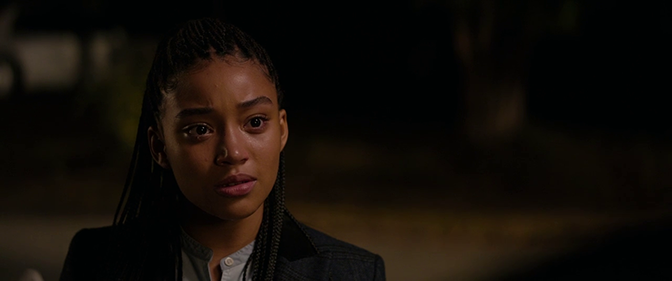The three main children in The Hate U Give are named Starr (Amandla Stenberg), Seven (Lamar Johnson) and Sekani (TJ Wright).
I’ve often wondered where these seemingly less traditional names come from – particularly names where the meaning is the name and the name the meaning. As a white person, perhaps I am accustomed to Anglo names where their origins are less obvious. Names like Elizabeth (meaning my God is my oath), John (meaning Yahweh is gracious), Harry (meaning home ruler), Jessica (meaning to behold), Robert (meaning bright fame), Hannah (meaning grace) and so forth.
When I have taught students named Goodness, Charity, Wisdom, Prince and others where the meaning of the name explains itself immediately, I had presumed their parents, often African (in the case of this film African American), had torn a random selection of words from a dictionary and pulled one out of a hat. But upon watching The Hate U Give it became clear to me these names, which are often values, traits or flattering abstract nouns, are allocated with deliberation. More so than the randomness of say Gwyneth Paltrow and Chris Martin’s fruit-based Apple or Kim Kardashian and Kanye’s compass-orientated North.
The children’s father Maverick ‘Mav’ Carter (Russell Hornsby) explains:
“You know not everybody got super-powers like you. Shine your light. I didn’t name you Starr by accident.
“I gave each of you power in your names. Seven – perfection, Starr – light, Sekani – joy. Use it so when you ready to talk, you talk. Don’t you ever let nobody make you quiet.”
And Starr does talk. The film talks. And we all need to talk.
Police shootings and deaths in custody have been the trigger for riots. In my living memory I recall two vividly: The first was the 2004 Redfern riots sparked by the death of Thomas Hickey. The second was upon my arrival in London when the 2011 London riots were triggered by the death of Mark Duggan.
Both years apart, yet still an ongoing issue. It’s not one I’ve experienced firsthand. I hope not to. But this film and the teen novel it is based on, by Angie Thomas, are valuable commentary on the privilege divide and the misplaced government resources that firstly lead to cases of police racism.
At times The Hate U Give seems to approach the subject with a certain superficial washed-out Hollywood glossiness. I suppose after all it is a teen drama, so can’t afford to get too gritty. Yet it raises the questions that need to be asked. It doesn’t shy away from biases on both sides, like when Starr brings home her white boyfriend Chris (K.J. Apa), leading to her father’s attempt to give him a tip, assuming the boyfriend is the cheauffer, then declaring, “That boy is white…Chris? What kind of plain-ass name is that?”
And indeed, what’s in a name? That which we call a rose by any other name would it smell as ‘plain-ass’? If we call a ‘spade’ a ‘shovel’ instead of a ‘spade’, should we call a ‘Harry’ a ‘Home ruler’ and call a ‘Hannah’ a ‘Grace’? If we mix our metaphors, should we avoid name-calling to realise we’ve confused verbs and idioms?
(For the record, ‘Chris’ can be etymologised to ‘Christ’. Draw your own biblical conclusions between Starr and Chris.)
The imagery of Starr being a beacon of light is ever present as her voice cuts through the rhetoric on both sides of this race issue to lead toward a stronger future. Her given name and ‘super-power’ had been granted in hope for her generation that they can achieve where others have failed (which reminds me, I also had a student called Hope – it makes sense to me now).
